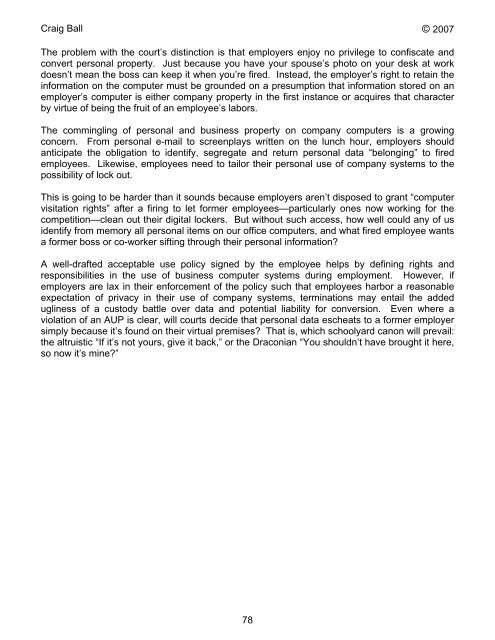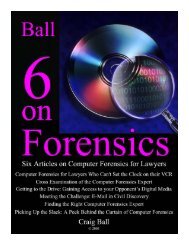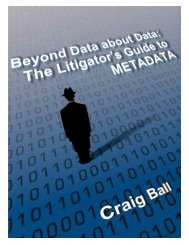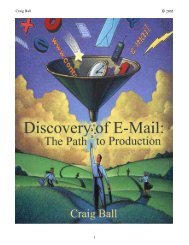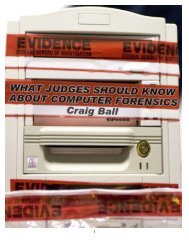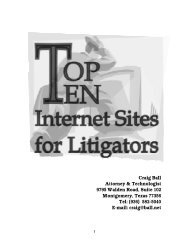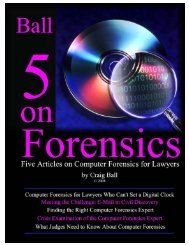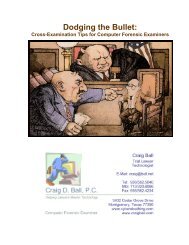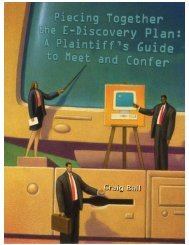Six Articles on Electronic - Craig Ball
Six Articles on Electronic - Craig Ball
Six Articles on Electronic - Craig Ball
Create successful ePaper yourself
Turn your PDF publications into a flip-book with our unique Google optimized e-Paper software.
<strong>Craig</strong> <strong>Ball</strong> © 2007<br />
The problem with the court’s distincti<strong>on</strong> is that employers enjoy no privilege to c<strong>on</strong>fiscate and<br />
c<strong>on</strong>vert pers<strong>on</strong>al property. Just because you have your spouse’s photo <strong>on</strong> your desk at work<br />
doesn’t mean the boss can keep it when you’re fired. Instead, the employer’s right to retain the<br />
informati<strong>on</strong> <strong>on</strong> the computer must be grounded <strong>on</strong> a presumpti<strong>on</strong> that informati<strong>on</strong> stored <strong>on</strong> an<br />
employer’s computer is either company property in the first instance or acquires that character<br />
by virtue of being the fruit of an employee’s labors.<br />
The commingling of pers<strong>on</strong>al and business property <strong>on</strong> company computers is a growing<br />
c<strong>on</strong>cern. From pers<strong>on</strong>al e-mail to screenplays written <strong>on</strong> the lunch hour, employers should<br />
anticipate the obligati<strong>on</strong> to identify, segregate and return pers<strong>on</strong>al data “bel<strong>on</strong>ging” to fired<br />
employees. Likewise, employees need to tailor their pers<strong>on</strong>al use of company systems to the<br />
possibility of lock out.<br />
This is going to be harder than it sounds because employers aren’t disposed to grant “computer<br />
visitati<strong>on</strong> rights” after a firing to let former employees—particularly <strong>on</strong>es now working for the<br />
competiti<strong>on</strong>—clean out their digital lockers. But without such access, how well could any of us<br />
identify from memory all pers<strong>on</strong>al items <strong>on</strong> our office computers, and what fired employee wants<br />
a former boss or co-worker sifting through their pers<strong>on</strong>al informati<strong>on</strong>?<br />
A well-drafted acceptable use policy signed by the employee helps by defining rights and<br />
resp<strong>on</strong>sibilities in the use of business computer systems during employment. However, if<br />
employers are lax in their enforcement of the policy such that employees harbor a reas<strong>on</strong>able<br />
expectati<strong>on</strong> of privacy in their use of company systems, terminati<strong>on</strong>s may entail the added<br />
ugliness of a custody battle over data and potential liability for c<strong>on</strong>versi<strong>on</strong>. Even where a<br />
violati<strong>on</strong> of an AUP is clear, will courts decide that pers<strong>on</strong>al data escheats to a former employer<br />
simply because it’s found <strong>on</strong> their virtual premises? That is, which schoolyard can<strong>on</strong> will prevail:<br />
the altruistic “If it’s not yours, give it back,” or the Drac<strong>on</strong>ian “You shouldn’t have brought it here,<br />
so now it’s mine?”<br />
78


